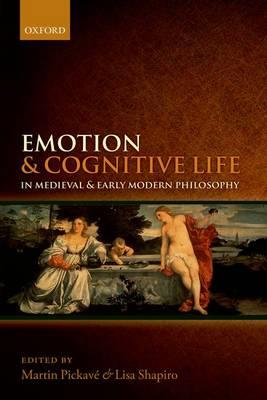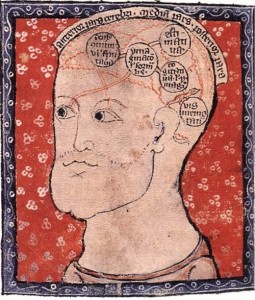 Emotion and Cognitive Life in Medieval and Early Modern Philosophy
Emotion and Cognitive Life in Medieval and Early Modern Philosophy
Martin Pickavé and Lisa Shapiro (eds.) Oxford University Press, 2012, pp.285
Anyone interested in philosophical characterisations of emotion, both contemporary and historical, knows the standard line concerning the relationship between emotion and reason. Emotions, traditionally conceived, motivate us to action in opposition to reasons. This can be a bad thing, causing us to do the worst whilst we see the best. But then again, what motivational force could reason possibly have without the passions? Maybe then it ought to be their slave…
The gambit of Emotion and Cognitive Life in Medieval and Early Modern Philosophy, edited by Martin Pickavé and Lisa Shapiro, is that this standard line tends to skew our thinking about emotions in two broad ways. Firstly, the opposition of emotional states to rational thought draws our attention towards the ethical dimensions of our emotional lives, at the expense of a more general understanding of the way emotions function in cognition. And secondly, contemporary attempts to resolve this opposition, such as the so-called ‘cognitivist’ view that emotions are certain types of judgements, often result in a much too simple assimilation of emotions to rationality.
Instead the task Pickavé and Shapiro set for themselves and the 11 other contributors to Emotion and Cognitive Life is that of presenting a nuanced and complex account of historical thinking about the intersection between emotional experience and cognitive activity. They do so in the hope that renewed “attention to the debates and concerns that engage philosophers of the medieval, Renaissance, and early modern periods can provide contemporary debate with a host of ideas regarding the relationship between emotions, cognition, and reason, or the way emotions figure in our cognitive lives.” (p. 2)
The most general theme explored throughout Emotion and Cognitive Life is the positioning of emotions within the soul. Amongst the medieval contributions this is a question of whether passions are essentially somatic, or whether some passions properly belong only to the intellective soul. Peter King’s contribution sets the stage for discussions of this and related questions by threading together Augustine and Aquinas’ engagement with the paradoxical Stoic notion of ‘goodpassions’, experienced by the passionless sage. Here King demonstrates how Aquinas turns what for Augustine are properly ‘dispassionate passions’ – such as God’s love – into ‘pseudopassions’, affections only analogous to passions.
Both Ian Drummond and Simo Knuuttila develop this theme further through explorations of John Duns Scotus’ notion of ‘passions of the will’. Drummond’s essay asks whether the will, as the appetitive faculty of the intellective soul, can coherently be said to experience passions insofar as its divinity consists in a radical freedom of action. Knuuttila, on the other hand, examines the causal basis of Scotus’ theory, where the will’s passions are caused by the activity of the soul’s apprehensive faculty. Knuuttila then links the 16th Century demise of Scotus’ passions of the will to Francisco Suárez’s rejection of causal interaction between the soul’s different faculties.
 The early modern essays addressing this theme shift from considerations of the appetitive nature of emotions to the function of the passions within the understanding. Lisa Shapiro presents a strong case for committing Descartes and Spinoza to the thesis she calls ‘passionate perception’, that “experience is, basically, intrinsically affective, and our sense perceptions fundamentally contain information about the importance of things to us, the sort of information we take as proper to the emotions or passions.” (p. 194) Deborah Brown examines the role of wonder in sustaining the conscious intellectual attention Malebranche deems necessary for the search after truth. And Lilli Alanen asks whether there is room in Spinoza’s hyper-intellectualist concept of mind for a passionate form of self-understanding.
The early modern essays addressing this theme shift from considerations of the appetitive nature of emotions to the function of the passions within the understanding. Lisa Shapiro presents a strong case for committing Descartes and Spinoza to the thesis she calls ‘passionate perception’, that “experience is, basically, intrinsically affective, and our sense perceptions fundamentally contain information about the importance of things to us, the sort of information we take as proper to the emotions or passions.” (p. 194) Deborah Brown examines the role of wonder in sustaining the conscious intellectual attention Malebranche deems necessary for the search after truth. And Lilli Alanen asks whether there is room in Spinoza’s hyper-intellectualist concept of mind for a passionate form of self-understanding.
Another focus of Emotion and Cognitive Life is the opportunity for dialogue between historical and contemporary accounts of the cognitive aspects of emotions. Some of the essays here concern the possibility (and the utility) of projecting contemporary debates back onto the past. On this front Martin Pickavé engages with contemporary ‘cognitivist’ accounts of emotion by examining Adam Wodeham’s explicit (and unusual) alignment of emotions with the apprehensive faculty (rather than the volitional faculty) of the rational soul. And Dominik Perler links medieval debates over animal passions to contemporary attempts to understand “the island of instrumental rationality” (p. 50) between the conceptual reasoning of humans, and the non-rational existence of plants. Conversely, a number of papers re-examine the past with the intention of opening up new avenues for debate. Paul Hoffman’s chapter examines early modern talk of passions as ‘inciting’ or ‘inclining’ the will and asks whether passionate inclinations might function somewhere between providing a reason to act and causing an action to occur. And Dennis Des Chene draws explicit attention to the role of physiology in Descartes’ moral theory, suggesting that Cartesian générosité should serve as the model for reconciling rational autonomy with human corporeality.
(La Primavera, Sandro Botticelli)
There are a few outliers in the collection that nonetheless make for some of the most interesting reading. Claude Panaccio’s technical paper on William of Ockham’s identification of the apprehensive and appetitive soul, though light on emotions, provides valuable conceptual background to the other medieval essays. Sabrina Ebbersmeyer’s study of Renaissance attempts to appropriate Platonic Eros for a public intellectual audience is a fascinating counterpoint to the otherwise academic focus of the collection. And Amy M. Schmitter’s genealogy of Hume’s account of the passions contains, to my mind, one of the most interesting ideas in the book: that Hume’s psychological mechanism of sympathy grounds both the replication and the mutation of passions within a population.
As a whole Emotion and Cognitive Life feels well edited, which is to say that it not only is well edited but that this fact intrudes on phenomenal consciousness at numerous points. The individual essays are each of a very high standard, and frequently state-of-the-art, but Pickavé and Shapiro’s skill in weaving together consistent and coherent themes across all 13 chronologically ordered essays remains, I think, the standout contribution. The obvious careful attention paid to the development of ideas throughout the collection sees that Emotion and Cognitive Life delivers engaging historical scholarship in a manner accessible to non-specialists. For anyone interested in philosophical characterisations of emotion, both contemporary and historical, it should affect a kind of joy mixed with wonder.
Gabriel Watts is an Education and Outreach Officer with the ARC Centre of Excellence for the History of Emotions. He is also a graduate student in philosophy department at the University of Sydney and mainly writes on David Hume’s engagement with Nicholas Malebranche.


Pingback: Carnivalesque #93 Pre-Modern History with Added Cats | The Renaissance Mathematicus